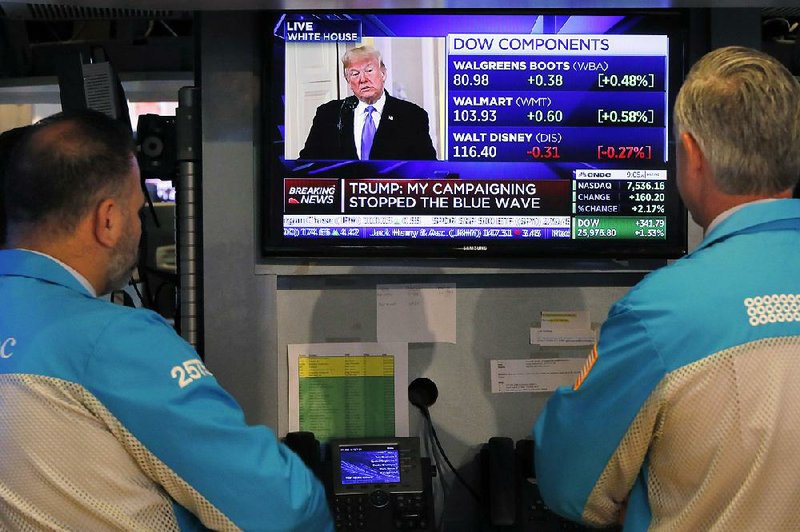NEW YORK -- Stocks rallied Wednesday as investors were relieved to see that the U.S. midterm elections went largely as they expected they would. Big-name technology and consumer and health care companies soared as the S&P 500 index closed at its highest level in four weeks.
Democrats won control of the House of Representatives while Republicans kept a majority in the Senate, as most polls had suggested. It's not clear how a divided Congress will work with Republican President Donald Trump, but if the possibilities for compromise and big agenda items seem limited, Wall Street is fine with that because it means politics is less likely to crowd out the performance of the strong U.S. economy.
"The market likes when what it expects to happen happens," said J.J. Kinahan, chief markets strategist for TD Ameritrade. "We haven't had that happen in a little while, when you think about major events like Brexit or the presidential election."
The S&P 500 index climbed 58.44 points, or 2.1 percent, to 2,813.89. The index has risen in six of the past seven trading days to recover most of the losses it suffered in October.
The Dow Jones industrial average rose 545.29 points, or 2.1 percent, to 26,180.30. The Nasdaq composite climbed 194.79 points, or 2.6 percent, to 7,570.75. The Russell 2000 index of smaller-company stocks added 26.06 points, or 1.7 percent, to 1,582.16. Three-fourths of the stocks on the New York Stock Exchange traded higher.
Historically, markets have performed well after midterm elections and with split control of Congress.
The Democrats' win in the House means Republicans likely won't be able to take another shot at repealing the 2010 Patient Protection and Affordable Care Act, which extended health insurance coverage to millions of Americans. Voters in Idaho and Nebraska voted to expand Medicaid, and the winning gubernatorial candidates in Maine and Kansas also favor expanding Medicaid benefits. A Medicaid-expansion proposition in Utah was leading in returns counted as of Wednesday evening.
Stocks for health insurers, hospital operators and Medicaid program operators all jumped. UnitedHealth gained 4.2 percent to $274.63, and hospital company HCA added 4.7 percent to $141.65. Molina, a provider of Medicaid-related services, surged 10.5 percent to $137.32.
Marijuana stocks jumped after Michigan voted to legalize the drug for recreational use and after Utah and Missouri voters approved medical marijuana measures. The stocks rose even further after the resignation of Attorney General Jeff Sessions, who promoted more aggressive enforcement of those laws. Tilray vaulted 30.6 percent to $139.60, and Canopy Growth rose 8.2 percent to $46.07.
Oil drillers Anadarko Petroleum and Noble Energy rallied after Colorado voters rejected a measure that could have sharply reduced oil and gas drilling, including the method known as fracking, by requiring new oil and gas wells to be farther from occupied buildings than is allowed under current law.
Anadarko gained 5.7 percent to $57.89, and Noble picked up 4.2 percent to $28.16.
Stocks are off to a strong start in November, and the S&P 500 is up 3.8 percent this month. That follows a swoon in October that knocked the S&P 500 down nearly 7 percent as investors worried about rising interest rates and the U.S.-China trade dispute.
High-growth stocks took an especially brutal beating last month. Quincy Krosby, chief market strategist at Prudential Financial, said it will be worth watching whether investors are willing to buy those stocks again or if they continue to prefer slower-growing, more "defensive" companies like utilities and household-goods makers.
On Wednesday, investors bet on growth. Amazon jumped 6.9 percent to $1,755.49, and Microsoft gained 3.9 percent to $111.96. Google's parent company, Alphabet, picked up 3.6 percent to $1,108.24.
Steady, "defensive" stocks lagged the rest of the stock market. Those companies, which include utilities and household-goods makers, tend to do well when stocks are in turmoil, but they're less appealing when investors are betting on economic growth.
Industrial companies made strong gains, but they didn't do as well as the rest of the market. While some investors hope that Trump and congressional leadership will pass an infrastructure stimulus bill, they've had those hopes dashed more than once since he took office.
It's not clear how the elections will affect the Trump policy that Wall Street might be most concerned about: the trade dispute with China. Trump has imposed tariffs of up to 25 percent on $250 billion of Chinese imports and threatened additional tariffs on top of those. Beijing has responded with tariffs on $110 billion of American goods.
A primary concern in Asia is the potential for trade tensions to hobble growth for export-reliant economies.
Economists at S&P Global, Oxford Economics and Bank of America all agreed that government gridlock will likely result from the Democrats winning control of the House. But they don't think a stalemate will automatically hinder economic growth.
It's more likely that government will play less of a role in spurring economic growth in 2019 and 2020. As a result, the health of the global economy, interest rates set by the Federal Reserve, and spending by U.S. consumers and companies will have bigger effects on determining the pace of growth.
Business on 11/08/2018

